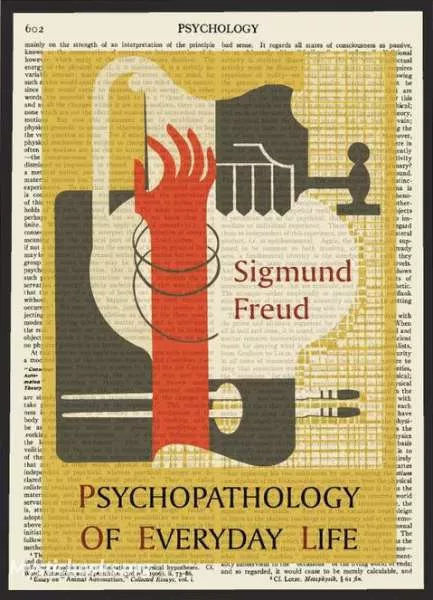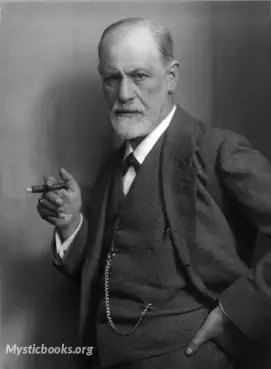
Psychopathology of Everyday Life
'Psychopathology of Everyday Life' Summary
Studying the various deviations from the stereotypes of everyday behavior, strange defects and malfunctions, as well as seemingly random errors, the author concludes that they indicate the underlying pathology of the psyche, the symptoms of psychoneurosis.
Freud writes in his introduction:
"During the year 1898 I published a short essay on the Psychic Mechanism of Forgetfulness. I shall now repeat its contents and take it as a starting-point for further discussion. I have there undertaken a psychologic analysis of a common case of temporary forgetfulness of proper names, and from a pregnant example of my own observation I have reached the conclusion that this frequent and practically unimportant occurrence of a failure of a psychic function – of memory – admits an explanation which goes beyond the customary utilization of this phenomenon. If an average psychologist should be asked to explain how it happens that we often fail to recall a name which we are sure we know, he would probably content himself with the answer that proper names are more apt to be forgotten than any other content of memory. He might give plausible reasons for this 'forgetting preference' for proper names, but he would not assume any deep determinant for the process."
Freud believed that various deviations from the stereotypes of everyday conduct - seemingly unintended reservation, forgetting words, random movements and actions - are a manifestation of unconscious thoughts and impulses. Explaining "wrong actions" with the help of psychoanalysis, just as the interpretation of dreams, can be effectively used for diagnosis and therapy.
Considering the numerous cases of such deviations, he concludes that the boundary between the normal and abnormal human psyche is unstable and that we are all a bit neurotic. Such symptoms are able to disrupt eating, sexual relations, regular work, and communication with others.
In the last chapter of his book, Freud deals with the problem of psychic determinism, for which he makes a case. He argues that "If one investigates, let us say, this seeming voluntary formation, for example, of a number of many digits uttered in unrestrained mirth, it always proves to be so strictly determined that the determination seems impossible". He then discusses a famous case of a name "arbitrarily chosen", the Dora's one. Analysing the motivation of his choice, it occurred to him that the nurse of his sister's children was named Dora. Then a slight recent event soon flashed into his mind which brought the looked-for determination. On his sister's dining-room he noticed a letter with the address "Miss Rosa W.". Flabbergasted, he was informed that the real name of Dora was in fact Rose, and that she had agreed to have her name changed in order to get the job, because Rosa would also refer to his sister".
Freud's conclusion is that:
"The unconscious, at all events, knows no time limit. The most important as well as the most peculiar character of psychic fixation consists in the fact that all impressions are on the one hand retained in the same form as they were received, and also in the forms that they have assumed in their further development. This state of affairs cannot be elucidated by any comparison from any other sphere. By virtue of this theory every former state of the memory content may thus be restored, even though all original relations have long been replaced by newer ones."
Book Details
Language
EnglishOriginal Language
GermanPublished In
1901Genre/Category
Tags/Keywords
Authors

Sigmund Freud
Austrian Empire
Sigmund Freud ; born Sigismund Schlomo Freud was an Austrian neurologist and the founder of psychoanalysis, a clinical method for treating psychopathology through dialogue between a patient and a psyc...
Books by Sigmund FreudDownload eBooks
Listen/Download Audiobook
- Select Speed
Related books

Emily's Quest by Lucy Maud Montgomery
It is a captivating coming-of-age novel that follows the journey of Emily Starr as she navigates the challenges and joys of young adulthood. This book...

He Can Who Thinks He Can by Orison Swett Marden
Do you have what it takes to be the person you want to be? This is a neat self help book in plain English by the New Thought Movement author Orison Sw...

How Mr. Rabbit Lost His Tail by Albert Bigelow Pain
Delight in the heartwarming children's book, "How Mr. Rabbit Lost His Tail," penned by the talented author, Albert Bigelow Paine. Join Mr. Rabbit on a...

For Love and Life Vol. II by Margaret O. Oliphant
This compelling book delves into the complexities of human relationships and the transformative power of love, guiding readers through a remarkable jo...

The Gentleman and Lady's Book of Politeness and Propriety of Deportment by Elisabeth Celnart
The Gentleman and Lady's Book of Politeness and Propriety of Deportment

Etiquette in Society, in Business, in Politics and at Home by Emily Post
Etiquette in Society, in Business, in Politics, and at Home (frequently referenced as Etiquette) is a book authored by Emily Post in 1922. The book co...

The Grey Man by S. R. Crockett
In the tranquil village of Balweary, nestled amidst the rolling hills of Scotland, an air of unease settles as a mysterious stranger, known only as Th...

The Inner Chamber and the Inner Life by Andrew Murray
Here is a book of devotions that will bring joy and strength. Its chapters provide vital keys to living and enjoying the Christian life. It covers imp...

Dialogues Concerning Natural Religion by David Hume
Dialogues Concerning Natural Religion is a philosophical work by the Scottish philosopher David Hume, first published in 1779. Through dialogue, three...

Hira-Singh's Farewell to Burmah by Laurence Hope
As the sun dips below the horizon, casting its golden hues across the Irrawaddy River, a young man named Hira-Singh stands on the deck of a departing...
Reviews for Psychopathology of Everyday Life
No reviews posted or approved, yet...